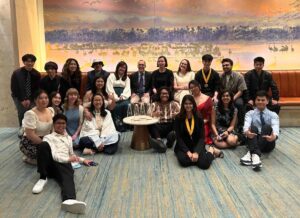 As an educator, you already may be familiar with Arthur Chickering and Zelda Gamson’s timeless “Seven Principles for Good Practice in Undergraduate Education,” which bases its principles on 50 years of research on college teaching and learning. We can gain some insights about how Skyline College fares on four of those principles from Skyline College’s spring 2016 administration of the Community College Survey for Student Engagement (CCSSE), which provides information on institutional practices and student behaviors that are highly correlated with student learning and retention. The four principles are:
As an educator, you already may be familiar with Arthur Chickering and Zelda Gamson’s timeless “Seven Principles for Good Practice in Undergraduate Education,” which bases its principles on 50 years of research on college teaching and learning. We can gain some insights about how Skyline College fares on four of those principles from Skyline College’s spring 2016 administration of the Community College Survey for Student Engagement (CCSSE), which provides information on institutional practices and student behaviors that are highly correlated with student learning and retention. The four principles are:
- using active learning techniques,
- developing reciprocity and cooperation among students,
- encouraging interaction between students and faculty, and
- giving prompt feedback.
This CCSSE brief focuses on students’ responses to a question that relates to active learning techniques. Students need opportunities to think about and apply what they are learning; Chickering and Gamson explain it best, that “[students] must make what they learn part of themselves” (4). In response to a CCSSE question pertaining to active learning, students were asked how often they asked questions in class or contributed to class discussions. When compared to the 2016 cohort, which consists of all community colleges that took the survey from 2014 – 2016, Skyline College students were 15% less likely to “often” or “very often” ask questions or contribute to class discussions. Their response to this question was among the lowest relative to the 2016 cohort.
Assuming that active learning enhances learning, what do you make of this survey finding? In your own teaching, do you think that you should provide more discussion opportunities, whether during or outside of class? What are the obstacles to having more discussions in your courses? How can you address said obstacles? You may want to consider how such changes may impact course content and classroom activities, how to structure such discussions to yield the most benefit, and other means to facilitate discussions outside of class, such as via online vehicles such as Canvas.
As instructors, we’re constantly engaged in self-reflection in order to strengthen our teaching. Hopefully this brief provided some food for thought, and perhaps a topic for discussion with your colleagues.
If you’d like to find out more about students’ responses to the CCSSE, please join us at the March 16 Academic Senate meeting or the April 13 Classified Senate meeting, where Skyline College’s Planning, Research, and Institutional Effectiveness staff will highlight main findings. The 2016 CCSSE results also are posted at http://skylinecollege.edu/prie/studentfeedback.php. For more information about the CCSSE, visit www.ccsse.org, or for a copy of the actual survey, see http://www.ccsse.org/aboutsurvey/docs/CCSR_2005.pdf .
Article by Karen Wong






